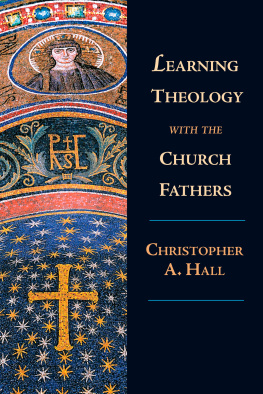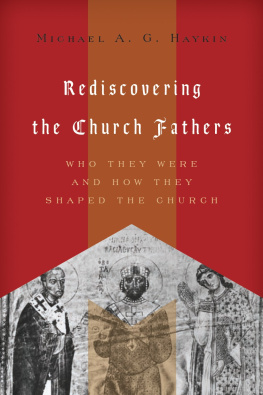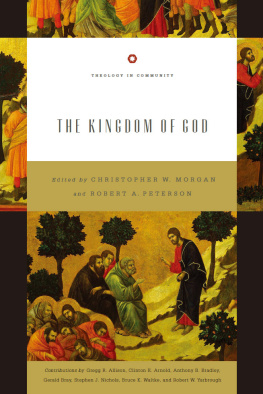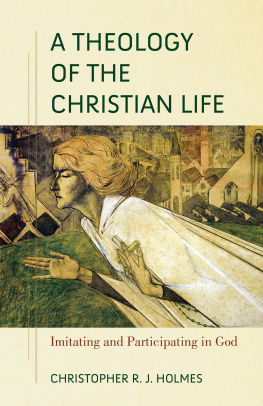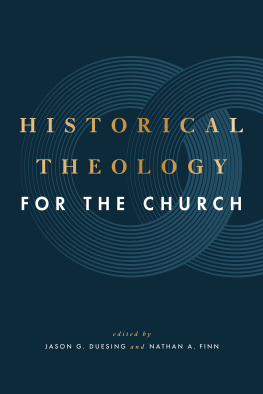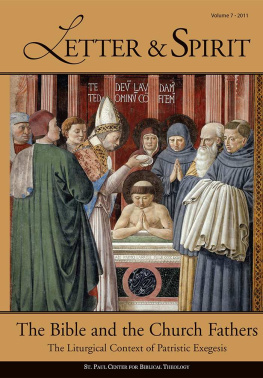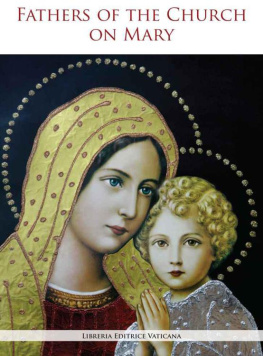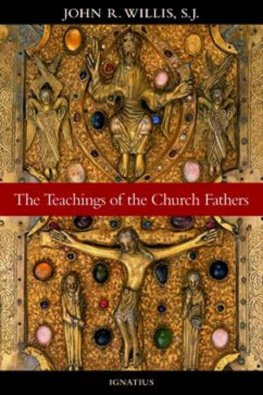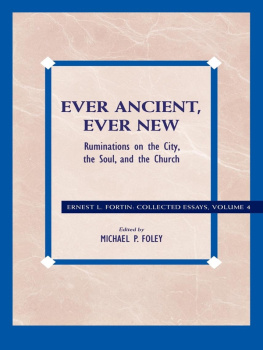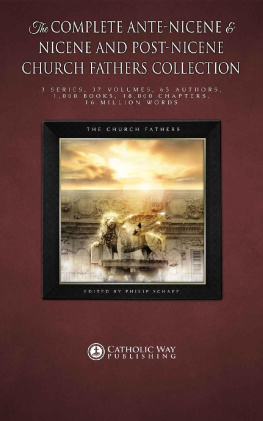Christopher A. Hall - Learning Theology with the Church Fathers
Here you can read online Christopher A. Hall - Learning Theology with the Church Fathers full text of the book (entire story) in english for free. Download pdf and epub, get meaning, cover and reviews about this ebook. year: 2002, publisher: InterVarsity Press / IVP Academic, genre: Religion. Description of the work, (preface) as well as reviews are available. Best literature library LitArk.com created for fans of good reading and offers a wide selection of genres:
Romance novel
Science fiction
Adventure
Detective
Science
History
Home and family
Prose
Art
Politics
Computer
Non-fiction
Religion
Business
Children
Humor
Choose a favorite category and find really read worthwhile books. Enjoy immersion in the world of imagination, feel the emotions of the characters or learn something new for yourself, make an fascinating discovery.
- Book:Learning Theology with the Church Fathers
- Author:
- Publisher:InterVarsity Press / IVP Academic
- Genre:
- Year:2002
- Rating:5 / 5
- Favourites:Add to favourites
- Your mark:
- 100
- 1
- 2
- 3
- 4
- 5
Learning Theology with the Church Fathers: summary, description and annotation
We offer to read an annotation, description, summary or preface (depends on what the author of the book "Learning Theology with the Church Fathers" wrote himself). If you haven't found the necessary information about the book — write in the comments, we will try to find it.
Learning Theology with the Church Fathers — read online for free the complete book (whole text) full work
Below is the text of the book, divided by pages. System saving the place of the last page read, allows you to conveniently read the book "Learning Theology with the Church Fathers" online for free, without having to search again every time where you left off. Put a bookmark, and you can go to the page where you finished reading at any time.
Font size:
Interval:
Bookmark:
LEARNING
THEOLOGY
WITH THE
CHURCH
FATHERS

A. HALL

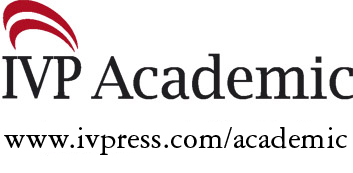
InterVarsity Press
P.O. Box 1400, Downers Grove, IL 60515-1426
World Wide Web: www.ivpress.com
E-mail:
2002 by Christopher Hall
All rights reserved. No part of this book may be reproduced in any form without written permission from InterVarsity Press.
InterVarsity Press is the book-publishing division of InterVarsity Christian Fellowship/USA, a student movement active on campus at hundreds of universities, colleges and schools of nursing in the United States of America, and a member movement of the International Fellowship of Evangelical Students. For information about local and regional activities, write Public Relations Dept., InterVarsity Christian Fellowship/USA, 6400 Schroeder Rd., P.O. Box 7895, Madison, WI 53707-7895, or visit the IVCF website at .
Scripture quotations, unless otherwise noted, are from the New Revised Standard Version of the Bible, copyright 1989 by the Division of Christian Education of the National Council of the Churches of Christ in the USA. Used by permission. All rights reserved.
Cover image: Archiepiscopal Chapel, apse, mosaic, Emilia Romagna, Ravenna, Italy / De Agostini Picture Library / A. Dagli Orti / The Bridgeman Art Library
ISBN 978-0-8308-7614-3 (digital)
ISBN 978-0-8308-2686-5 (print)
This digital document has been produced by Nord Compo.
To two valued mentors in the faith:
W. Ward Gasque and
J. I. Packer
Learning Theology with the Church Fathers is the second volume of a projected three-volume set: Reading Scripture with the Church Fathers (patristic biblical interpretation); Learning Theology with the Church Fathers (patristic reflection on key theological topics and issues: Scripture, Christ, the Trinity, the Holy Spirit, sin and salvation, providence, the church and the resurrection); and a book provisionally titled Praying with the Church Fathers (patristic reflection and practice in the spectrum of Christian spirituality: prayer, worship, the Eucharist, baptism, Christian witness and service to the poor).
Reading Scripture with the Church Fathers, the first volume of the series, is a basic introduction to the manner and content of patristic biblical interpretation. In it I focus on the eight great doctors of the churchAthanasius, John Chrysostom, Basil the Great and Gregory of Nazianzus in the East; Ambrose, Augustine, Jerome and Gregory the Great in the Westusing these masters of the faith as examples of how the fathers read and interpreted the Bible. I also provide basic biographical and bibliographical background for those who want to explore patristic hermeneutics further.
When I had finished writing Reading Scripture with the Church Fathers I knew there were still vast areas of patristic wisdom and insight that I had yet to touch. What, for example, of the thoughts of the fathers on key theological topics such as the authority of Scripture, tradition, the Trinity, the incarnation of the Son, the Holy Spirit, sin, grace, redemption, suffering and evil, providence, the church and the resurrection of the dead? These subjects in themselves called for a second book. Hence, the volume you now find in your hands, Learning Theology with the Church Fathers.
I acknowledge readily and immediately that the fathers never split theology off from spirituality, as though theology was an academic, mental exercise best practiced in ones study, while Christian spirituality was more appropriately focused on the heart and centered in a church sanctuary. Any split between mind and heart, theology and spirituality, study and sanctuary would have met with scant toleration from the fathers.
For the fathers, as for at least one of the three great ecclesiastical communions of the Christian worldEastern Orthodoxytheology and spirituality, the Christian mind and heart, worship and reflection are an inseparable whole. The fathers continually remind us that theology is at best broken speech about the transcendent, mysterious God who draws near to us in the incarnation of the Son and the presence of the Spirit. Within the context of worship, whether through the proclamation of the Word from the pages of Scripture or in the celebration of the sacraments, God draws near to us. Here we learn what we can and cannot know and speak within the inherent limitations of human language as we attempt to understand and express faithfully the wonder of who God is and what God is up to in human history. Our thoughts and words about God will always and inevitably fall short in their attempt to capture and explain Gods nature and actions.
Anthony Ugolnik chides the Wests tendency to avoid the essentially mysterious nature of Christianity rather than [to] adore it. He writes:
We [Christians in the West] confess to doctrines profoundly mysterious by their naturethat a man should be God, that one God should be at the same time three persons, that we of corruptible flesh should also be temples of the living God. So we believe, but so we cannot comfortably think. For as thoughts, these are in essence mystery. Mystery is what many contemporary minds are hungry for; it is what they seek far afield, in the non-Christian realms and such Eastern, Asiatic sources as the Bhagavad Gita and the Tibetan Book of the Dead. We Christians in the West have not shared what we possess. We have mystery in plenty, yet our discourse averts it, avoids it as if in embarrassment. For mystery is what we have been taught through our education to extinguish.
Ugolnik is not arguing that all speech about God is necessarily impossible and unproductive. Thinking and speaking about God is surely a possible and praiseworthy endeavor, if our reflection and speech are formed and informed within the context of worship. For it is within worship, the fathers insist, that we encounter the mystery of God and Gods acts on our behalf and learn to think, speak and reverently respond to divine realitiesall the while acknowledging that our words fall far short of the wonder they are feebly attempting to encompass and describe.
Daniel Clendenin, an evangelical theologian, explains that Eastern Orthodox theology, a theology deeply rooted in the fathers, is far removed from the theological abstractions common in the West. Adoration, contemplation, and vision, not rational intellection, characterize the Eastern tradition. For instance, Clendenin directs us to the christological formulations of the Chalcedonian Creed as an example of how Eastern fathers went about their work.
The fathers describe the union of the divine and human natures of Christ by employing a series of four negative words: the two natures of Christ exist without confusion, change, division, or separation. That is, as Clendenin explains, the creed states the fact of the union of Christs two natures in one person and does so in such a way that we avoid theological error, but it resists any temptation to provide a rational explanation of how this can be.
In this vein, John Climacus (A.D. 579-649) writes that the word spoken by the theologian remains hollow if not grounded in personal experience in worship:
Do you imagine plain words can precisely or truly or appropriately describe the love of the Lord and assurance of the heart? Do you imagine that
Font size:
Interval:
Bookmark:
Similar books «Learning Theology with the Church Fathers»
Look at similar books to Learning Theology with the Church Fathers. We have selected literature similar in name and meaning in the hope of providing readers with more options to find new, interesting, not yet read works.
Discussion, reviews of the book Learning Theology with the Church Fathers and just readers' own opinions. Leave your comments, write what you think about the work, its meaning or the main characters. Specify what exactly you liked and what you didn't like, and why you think so.

